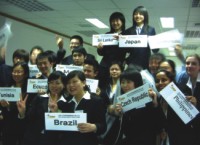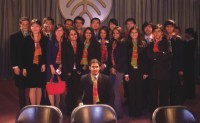|
Education
The United Nations, Just Smaller
Nader Rahman
 |
Excited delegates hold up their placards in an informal moment. |
The United Nations is currently a much-maligned organisation, everyone has their different views on that topic, but for one to truly understand how it works there is no better way to understand it than taking part in the Model United Nations. The mock committees put forward very real topics and then for a resolution to be passed it all comes down to the delegates' diplomacy skills. There can be no greater insight into the organisation until one sees how it is run, and actually takes part.
This year the Asian International Model United Nations (AIMUN) was held in Beijing, China, from the 14th to the 17th of March at Peking University. That is where I received my first real insight into the UN. The conference was of epic proportions as it was spread out over four days, encompassed the whole university as innumerable volunteers took care of hundreds of delegates. The only team from Bangladesh was sent by the United Nations Youth Students Association, as they sent nine delegates to comprise an amalgamated Bangladesh team.
The team was led by Farheena Rahman of London College of Legal Studies and included Nafiz Nipun of Dhaka University, Saharnaz Faruk of American International University Bangladesh, Nusrat Matin and Ziyad Nazem of East West University along with Adnan Khandakar, Farah Ahmed, Shehrina Kamal and myself from North South University. The nine of us represented five different countries in four committees. We had delegates in the Disarmament and International Security committee, Human Rights Council, ASEAN and The Economic and Social Commission for Asia and the Pacific. Each committee had two topics open for discussion and they were all highly specialised. The aim of each individual committee was to pass a resolution on the given topics, and that its self was a huge task.
 |
The entire Bangladesh delegation with the organising committee of the conference. |
With topics such as multinational cooperation in resource exploitation, the illicit transfer of small arms and light weapons and minimising the discrimination of immigrants in developed countries one could say our intellect was put to the test. The toughest aspect of the discussions was that everybody was representing a country other than their country of origin. For four days the nine of out team were officially Sri Lankan, Philippine, Jordanian and Venezuelan. Pre conference research played a vital role for the conference itself. Having researched our specific countries points of view on the different topics, we all prepared position papers, which acted as guides for all other delegates at the conference. The position papers represented our countries stances on the issues put forward and it was also an easy way for delegates representing different countries to pick out their allies.
The Bangladesh delegation went to Beijing well prepared and it showed through our performances. We had three delegates in the disarmament and international security committee, all of whom spoke eloquently and intelligently on the tricky topics brought up. Two of our team members played major roles in finalising the draft resolution and spoke on innumerable occasions. While the head of the committee was impressed by their performances, their true judgment came from their peers, who gave them standing ovations on more than one occasion.
The economic and social commission for Asia and the pacific was a small committee and included two of our team members, they were both extremely active and used their diplomacy skills subtly to push for their amendments to in the final draft resolution. For the ASEAN committee although we had two representatives, one of them fell extremely sick, thereby leaving us with effectively one delegate. Representing the Philippines he was gave us yet another solid performance. Finally the Human Rights council was where we made the biggest splash. Our two delegates outshone almost everyone from the committee, so much so that our team leader Farheena Rahman received the Best Delegate award.
 The conference was not only about resolutions and negotiations, in encompassed an entire “Chinese experience” as they put it. There were cultural evenings, campus tours of scenic Peking University campus along with global villages. They tried to give the delegates the whole package, and they did so fantastically. The Bangladesh team did not get caught up in the festivities, till the end they stayed true to their real purpose of leaving an impression on the Asian International Model United Nations. At the closing ceremony we gifted the entire organising committee traditional gamchas which proved to be a great success. Success that was not topped by the awards we received, Farheena Rahman received the best delegate award, while the big award for best delegation was won by none other than team Bangladesh. That was as one might say mission accomplished. The conference was not only about resolutions and negotiations, in encompassed an entire “Chinese experience” as they put it. There were cultural evenings, campus tours of scenic Peking University campus along with global villages. They tried to give the delegates the whole package, and they did so fantastically. The Bangladesh team did not get caught up in the festivities, till the end they stayed true to their real purpose of leaving an impression on the Asian International Model United Nations. At the closing ceremony we gifted the entire organising committee traditional gamchas which proved to be a great success. Success that was not topped by the awards we received, Farheena Rahman received the best delegate award, while the big award for best delegation was won by none other than team Bangladesh. That was as one might say mission accomplished.
The entire event was truly one to savour. Even though the event was billed as Asian, many teams turned up from Europe and America and only added to the flavour. Essentially that's what the United Nations is about, bringing people from all over the globe together, to solve the world's problems. The model united nations is by far the best way to understand the inner workings of the UN. What I learnt from the experience was that diplomacy is the first last and only way to solve a problem.
Copyright (R) thedailystar.net 2007 |
